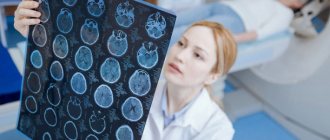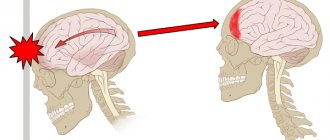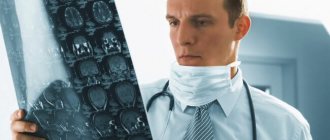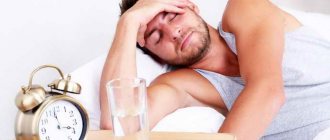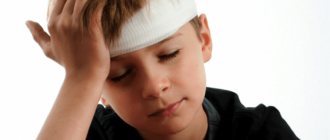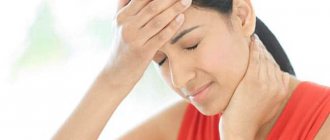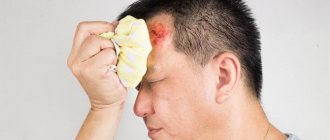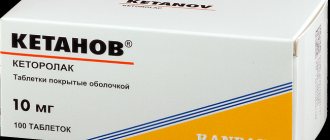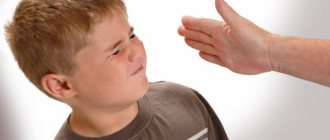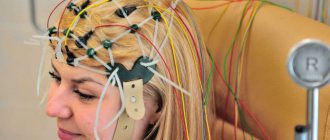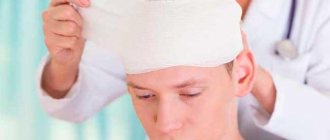A concussion is a fairly common closed TBI. It can be caused at home or at work, due to an accident or as a result of a criminal attack on the victim.
From a medical point of view, this injury causes slight harm to a person’s health, but with improper treatment and rehabilitation, this harm can be moderate or even severe, i.e. result in disability.
Therefore, everyone should know what a concussion is, how to provide first aid if it occurs, what are the basic principles of treatment and rehabilitation, what medications should be taken orally and what injections for a concussion should be given intramuscularly, intravenously or using a drip to the patient .
At the same time, remember that treatment of a concussion after a thorough diagnosis and complete exclusion of bruise or swelling, as well as cerebral hemorrhage, is prescribed only by a neurologist together with a traumatologist. In difficult cases, consultation with a neurosurgeon is required.
Tablets for concussion: principle of action
Typically, therapy is aimed at eliminating pain, reducing emotional tension, increasing the elasticity of blood vessels, and preventing exacerbation of chronic diseases.
Concussion
A concussion usually refers to a minor injury that occurs as a result of a blow to the head during a fall, accident, fight, or playing sports. Appears in both children and adults.
Due to damage, the brain changes location for some time, receives a blow to the inner wall of the skull and returns to its place.
At the same time, some nerve cells do not keep up with the movement and stretch or break off.
As a result:
- cell nutrition is disrupted;
- vascular damage occurs;
- small tears appear;
- brain activity suffers;
- hematomas occur.
With a concussion, the changes are reversible.
Symptoms
The main signs of a concussion are headache, nausea, pallor, and sleep disturbances. The severity of the symptoms suggests three degrees of injury.
In the first degree, loss of consciousness is possible for a short time, literally up to five minutes. There is a loss of sense of place and time, dizziness, and spots appear before the eyes. The man turns pale.
Movement and speech are not impaired. Treatment is carried out at home.
The second degree is characterized by a longer loss of consciousness, vomiting, and blurred vision. It manifests itself as tinnitus, a feeling of numbness in the limbs, and deafness. The person loses orientation, control over what is happening, and is inhibited. The victim can be treated either at home or in a hospital.
In the third degree, a person loses consciousness for a longer time; when he comes to his senses, he does not remember what happened. He feels nauseous, complains of dizziness, weakness, and may lose his balance. Vomiting appears, there is noise in the ears, darkness appears before the eyes. The patient is indicated for hospitalization.
Sometimes symptoms do not appear immediately. For example, when a hematoma or edema grows after a stable condition, a headache occurs and fainting occurs.
Concussion medications that improve the condition after the injury depend on its severity.
First aid
Detection of signs of a concussion in a person requires immediate assistance. The patient is placed on a flat horizontal surface. It shouldn't be soft. If there is no reason to suspect a spinal injury, the patient is placed on his side with his lower leg bent and his arm under his head. This position will prevent swallowing of the tongue and vomit from entering the respiratory tract.
Open wounds on the head should be treated with an antiseptic solution, and the edges should be lubricated with antimicrobial agents, for example, iodine. Cold compresses can be used to relieve headaches.
It is not allowed to independently prescribe and take medications for a concussion without a doctor’s prescription.
Treatment
The main method of treatment is medication. The choice of tactics depends on the diagnostic results, including radiography, computed tomography or magnetic resonance imaging, and electroencephalography. The patient is advised to consult an ophthalmologist. Medicines for concussions are prescribed taking into account the diagnostic results. Sometimes studies show no signs of damage.
Against headaches
In order to relieve pain symptoms, doctors will prescribe Analgin or Baralgin. However, if the pain is painful, incessant, and very strong, drugs such as Pentalgin, Medalgin, Maxilgan are used. It is possible to prescribe Ketorolac or other non-steroidal anti-inflammatory drugs.
Against dizziness
The feeling of being dizzy after a concussion occurs very often. It appears after the slightest physical exertion, when changing posture, or in the normal state when a person is lying down. Tanakan, Belloid, Papaverine are used to relieve this symptom.
Anti-nausea
Children are prescribed Cerucal for vomiting and nausea. This drug can also be used in adults. The use of Metoclopramide is indicated. These drugs are prescribed only as symptomatic treatment. When symptoms decrease, they are excluded from therapy.
Against sleep disorders
A concussion is accompanied by sleep disturbances. More often it manifests itself in excessive drowsiness of the patient. It is treated with drugs containing ginseng, echinacea, and eleutherococcus. So, they use Panktocrine. These medications are prescribed in small doses.
In cases where the patient is tormented by insomnia, he is prescribed Phenobarbital. Corvalol and motherwort will help you calm down. Before going to bed, it is useful to drink a cup of green tea or chamomile decoction.
Against psycho-emotional disorders
Tranquilizers will help calm down when the patient develops depression, phobias, irritability, or constant anxiety. Medicines in this group: Nozepam, Phenazepam, Dormiplant.
Diuretics
In adults, for concussions, tablets are used to combat increased intracranial pressure and swelling. In these cases, diuretics are prescribed: Diacarb, Arifon, Veroshpiron.
To stabilize brain function
Medicines such as Nootropil and Piracetam help restore neurons, improve their nutrition, normalize metabolism, and activate thinking and memory. Glycine is prescribed for medicinal purposes.
Treatment with nootropic drugs is indicated to begin only 5 or 7 days after the concussion. Injectable drugs, such as Cerebrolysin, are given intravenously.
To strengthen blood vessels
Vasotropic drugs are aimed at increasing the stability and elasticity of blood vessels. They help remove spasms, normalize blood viscosity, activate metabolism, and prevent necrosis of nervous tissue. Actovegin, Dexamethasone, Vasotropin are used.
Vitamin complexes
Restoring health after a head injury is impossible without the use of vitamin and mineral complexes. To speed up the normalization of the condition, folic acid, vitamin B, C, magnesium, and phosphorus are indicated. Centrum, Cogitum, Vitrum can be used.
Special cases
Particular attention should be paid to the treatment of older people. They are simultaneously prescribed medications against atherosclerosis, for example, Atorvastatin, Simvastatin, Rosuvastatin.
In the presence of chronic diseases, patients should take medications against the underlying pathology, for example, hypertension, diabetes. A concussion can be a factor that will worsen a stable condition and lead to an exacerbation of these diseases.
If the patient has ever had convulsions or epileptic seizures, an anticonvulsant drug is prescribed.
Consequences
If the correct treatment is prescribed and all the doctor’s instructions are followed, the patient will fully recover. Otherwise, some complications may arise:
- Postconcussion syndrome develops, including frequent attacks of headaches, sleep disturbances, and irritability.
- Emotional disorders: lability, aggressiveness, impulsiveness. The patient becomes depressed and develops phobias.
- Signs of vegetative-vascular dystonia.
- Sleep disorders.
- A person who drinks alcohol can provoke the appearance of epilepsy.
Rehabilitation
To prevent the development of complications, it is recommended to take pills prescribed by your doctor. If you have a concussion, you need to get enough sleep, ventilate the room before going to bed and during the day, do exercise therapy, and take walks.
The patient is advised to give up smoking, heavy food, alcohol, and strong coffee. In the first days, it is important not to play on computers or watch videos. It is better to take a vacation, avoid heavy exercise, and spend the first two days in bed.
Severe cases are the basis for physiotherapy, massage, and acupuncture.
The therapy prescribed by a doctor for a concussion is complex. Anti-concussion pills are aimed at eliminating pain and dizziness. They stabilize brain functions, normalize metabolic processes, and calm. Following the doctor's recommendations will allow you to quickly forget about the injury.
Source: https://neuromed.online/tabletki-ot-sotryaseniya-golovnogo-mozga/
Treatment
After clarifying the diagnosis and completely excluding other serious brain injuries using a traditional examination and questioning and modern instrumental methods (X-ray, CT, MRI, neurosonography, EEG, etc.), it is important to strictly follow all the instructions and prescriptions of the attending physician. This is especially true for infants under one and a half years old, whose brain is too unprotected and susceptible to any trauma.
A neurologist places a patient suffering from a concussion on bed rest and complete rest for two weeks. The fact is that during this period of time, even bright light and loud sounds can have a negative effect on the patient’s brain.
The doctor can discharge the patient from the inpatient department for outpatient treatment if he does not experience any complications for several days. This also applies to infants, who can be discharged against the signature of the parents, who guarantee the attending physician to organize bed rest and complete rest for their child. home.
Medicines
Treatment with medications for a concussion is aimed at normalizing the functioning of the brain and improving its activity, as well as relieving the symptoms characteristic of this injury, namely:
- headache;
- dizziness;
- apathy;
- irritability;
- insomnia, etc.
Typically, medications prescribed by a neurologist are:
- neuroprotectors (nootropil and piracetam);
- cerebrolysin or somazine intravenously;
- painkillers (analgesics);
- sedatives (valerian, motherwort, corvalol, valocordin);
- tranquilizers (phenazepam, nozepam, rudotel);
- sleeping pills (relaxone, adaptol, dormiplant);
- against dizziness (tanakan);
- nootropic (glycine, nootropil);
- vascular (cavinton, stugeron, sermion, instenon);
- antioxidants intravenously (actovegin, mildronate), etc.
The following are used as tonic and restorative medicines:
- ginseng root;
- motherwort;
- Eleutherococcus extract;
- lemongrass fruits and so on.
All medications are most often prescribed in tablet form, and in severe cases - by injection or through droppers.
In each specific case, the attending physician selects the most effective drug for a particular patient.
It is important to remember the need to regularly take multivitamins and folic acid for this injury as prescribed by your doctor.
Forecast
After a concussion, patients may be plagued by attacks of asthenia, from which the following will help:
- pantogam;
- vizopal;
- cogitum.
For elderly people, according to indications, the doctor prescribes a course of anti-sclerotic therapy, as well as treatment of concomitant diseases, a significant part of which is used intramuscularly or intravenously.
After a concussion, it is recommended to stay under medical supervision for a year, be observed and periodically consult with your neurologist, and also rest for a month.
Injections for concussions in adults
A concussion is a fairly common closed TBI.
It can be caused at home or at work, due to an accident or as a result of a criminal attack on the victim.
From a medical point of view, this injury causes slight harm to a person’s health, but with improper treatment and rehabilitation, this harm can be moderate or even severe, i.e. result in disability.
Therefore, everyone should know what a concussion is, how to provide first aid if it occurs, what are the basic principles of treatment and rehabilitation, what medications should be taken orally and what injections for a concussion should be given intramuscularly, intravenously or using a drip to the patient .
At the same time, remember that treatment of a concussion after a thorough diagnosis and complete exclusion of bruise or swelling, as well as cerebral hemorrhage, is prescribed only by a neurologist together with a traumatologist. In difficult cases, consultation with a neurosurgeon is required.
How does a concussion occur?
In different situations, a person can get injured: ice, a car accident, loss of consciousness followed by a fall, domestic injuries, dangerous work, a state of drug or alcohol intoxication.
The brain consists of soft tissues and with a sharp blow it shifts in the direction of the push, and then a return movement is created. As a result, the brain can be damaged by contact first with one side of the skull, then with the opposite. During the displacement process, vascular rupture, hematoma, hemorrhage, swelling and similar troubles can occur.
Even if you have a minor injury, you should get checked by a doctor to ensure a healthy future. Unfortunately, it is not always possible to give a person pills due to vomiting during a concussion.
Symptoms and stages
It's easy to overlook the symptoms. Especially if the patient has a mild concussion. But paying close attention to your own health will help you identify the disease in time and take action. The main symptoms are the same for everyone and continue for some time after the patient begins to use the medicine for a concussion. Here are the main symptoms:
- dizziness;
- vomit;
- disorientation in space and time;
- decreased brain activity;
- negative reaction to harsh light;
- headache, often throbbing;
- pallor;
- loss of consciousness (fainting);
- amnesia;
- floaters, ripples before the eyes;
- high body temperature;
- feeling of fear, panic.
Depending on the force of the impact, the age and health of the victim, three stages of concussion can be distinguished. Based on the degree of damage, different treatments are prescribed.
With a minor injury, most often the patient does not lose consciousness, but if this happens, the fainting lasts no longer than 5 minutes. Such people experience dizziness, blurred vision, and pallor. Medical help is definitely needed.
A moderate degree of damage is characterized by loss of consciousness for 10-15 minutes, vomiting, numbness in the fingers, ringing in the ears, and severe headache. You don't have to decide for yourself which medications to take for a concussion. Leave this to the discretion of the doctor - he has the knowledge and experience.
Source: https://golovnoj-mozg.ru/travmy/ukoly-pri-sotryasenii-golovnogo-mozga-u-vzroslyh
Concussion
Encyclopedia of Health / Encyclopedia of Children's Health
The child suffered a concussion. How is this injury treated? What consequences should we expect now?
Worldwide, the leading month for injuries is July. In Russia, January and February are also the most dangerous months for injuries. Slippery. And our winter fun is wild.
EMERGENCY ON HILL
If a child, after hitting his head, feels very bad or his condition worsens before our eyes, call an ambulance. You can take him to the doctor - go to the emergency room yourself. The position: let the baby lie down, come to her senses, and then, lo and behold, everything will work out - it’s fundamentally wrong. Yes, the main treatment for a concussion is sleep and rest, but how do you know that it is a concussion and not a brain injury - a more serious injury that requires urgent hospitalization and mandatory drug treatment.
Distinguishing a concussion from a bruise is a matter for specialists.
In the emergency room, if a concussion is suspected, the child will be given an X-ray, they will look for skull cracks and hemorrhages, and the regional neurologist will be informed about your injury. If necessary, they will be sent to the hospital.
WHAT IS POSSIBLE, WHAT IS NOT POSSIBLE
For a minor concussion, the doctor will prescribe bed rest and long sleep for the child. This treatment can be successfully carried out at home, the main thing is not to violate the regime. Parents often ask what can and cannot be done during a concussion.
| WARNING SYMPTOMS *The child is pale, sweating, weak *has trouble concentrating his eyes *complains of a headache and nausea *does not want to eat, vomits when trying to feed him *watching TV can also provoke vomiting *is inhibited, answers at random, repeats the same things several times phrases *poor orientation in the space of his own apartment and in time *in rare cases, vascular disorders that occur during a concussion are manifested by a slight increase in temperature. A short-term loss of consciousness is also a symptom of a concussion, but the child does not always understand whether it happened. If he does not remember what happened immediately before the injury and immediately after it, then there was a loss of consciousness. And three or four signs are enough to suspect a brain injury. |
If the head is no longer dizzy and does not hurt, the child can read a little, but it is better if his parents read aloud to him. You can listen to music, but not through headphones!
Now more than ever, children benefit from fruits and vegetables, fortified drinks and fresh air. But you can’t go for a walk, which means you need to ventilate the room often.
But what is not useful is watching TV, videos, playing on the computer, Gameboy or Tetris. Flashing frames irritate the brain.
Even after a mild concussion injury, the patient will stay at home for 7-10 days. Doctors, playing it safe, are in no hurry to prescribe such children to school or kindergarten too quickly. Now they can’t possibly hit their heads again while running around during school breaks. For a month or two, the child will also be exempt from physical education lessons and any other sports activities.
A more severe injury - brain contusion - will require longer adherence to a gentle regimen.
WITHOUT CONSEQUENCES?
Parents usually ask: “Will there be any consequences of the injury?” In most cases, everything ends well. But it happens that after a concussion, a child’s intracranial pressure increases; when everyone has forgotten about the injury, headaches appear out of nowhere; Sometimes visual acuity deteriorates, the child suffers from increased fatigue, irritability, and it becomes difficult for him to withstand a heavy school load...
Do not allow children to ride a bicycle without a helmet. Not to mention snowboarding, skateboarding or snow scootering!
When the acute period of the disease passes, doctors recommend doing an electroencephalogram. But, even after making sure that the child no longer has any problems, do not erase the memory of the injury - a concussion - from consciousness forever, just as do not throw away the doctors’ opinions. Who knows how this event will come back to haunt us in the future. And convince your child to take care of his head in the future.
Tablets for concussions: a list of the most effective medications
Among traumatic brain barotraumas there are conditions of varying severity, which occupy a dominant position with the same frequency regardless of age. Experts say that it is not the damage itself that you should worry about, but the consequences that it can cause over time.
To prevent the occurrence of such a scenario, special treatment is prescribed, aimed at minimizing possible complications in the future. Tablets for concussions and other health-improving therapies are prescribed exclusively by a competent specialist.
After all, the dosage, duration of use and type of drug are selected according to the severity of the injury and the physiological characteristics of the patient.
How does a concussion occur?
Cerebrospinal fluid, or cerebrospinal fluid, surrounds the main thinking organ on all sides. The brain, one might say, floats in it, thereby reducing the negative consequences of impacts on the skull. But severe mechanical damage to the head can lead to a concussion.
The phenomenon causes:
- disruption of metabolic processes in organ tissues;
- vascular injury - numerous small ruptures;
- microcracks in the bark;
- difficulty feeding cells;
- hemorrhage (rare).
There are no age or gender restrictions for receiving this damage. A concussion can be triggered by a fall or injury during sports or outdoor activities.
A pathology of this kind can be diagnosed even in an infant who has been put to sleep too zealously by rocking the crib.
First aid
Having called a medical team, you need to help the patient wait for them with minimal damage to health.
Sequencing:
- If the injured person is lying down, do not lift him. The exception is the situation on the roadway. Otherwise, place the person on a hard, horizontal surface.
- Turn your head so that if the patient loses consciousness, he does not swallow his own tongue, which threatens suffocation. Vomit or other bodily fluids may also enter the respiratory tract.
- If the presence of fractures of the limbs and spinal column is completely excluded, it would be better to lay the victim on his side, bending his right leg and placing his hand under his head.
- If there are open injuries, you need to treat them with an antiseptic and apply iodine to the edges.
The main thing is not to leave the victim alone.
After the doctors arrive, the patient will most likely be taken to the hospital. facility for examination and treatment of severe concussion.
Diagnostic procedures
Before starting health measures, it is necessary to determine the degree of concussion.
The neurologist conducts a survey to collect anamnesis, finding out the details of the injury and symptoms. If the patient is conscious and can speak, the conversation is carried out with him.
It is important that at this time there is a person nearby who provides first aid. By the time the injured person is delivered to the hospital, the clinical picture may change.
Worth knowing! Treatment should only be carried out by qualified specialists, and it is not recommended to administer any drugs yourself.
When signs indicate a violation of the integrity of the skull, additional diagnostic procedures are required that are aimed at identifying the presence of tumors, hematomas, etc.
During the healing process, the patient must avoid stress and physical activity, follow bed rest and the doctor’s recommendations. Such measures will reduce the period of stay in a hospital hospital, recover faster, minimize the threat of complications and make the rehabilitation period shorter.
Drug therapy: list of drugs
Different medications are prescribed for a concussion, based on the complexity of the injury, the age of the patient and the characteristics of the clinical picture of the pathological condition.
Painkillers
Most often recommended:
- Baralgin;
- Analgin;
- Sedalgin;
- Maxigan;
- Diclofenac;
- Ketorolac;
- Citramon;
- Pentalgin.
Prescribed if a person complains of persistent headache after injury. Most often, this symptom is the main sign of a concussion.
If the intensity of discomfort is high, the doctor prescribes combination drugs with an antispasmodic or sedative effect.
The main action is aimed at blocking pain receptors and opening blood vessels, thereby eliminating unpleasant sensations.
They cannot be taken for a long time because they have a toxic effect on the liver.
General distinctive features of the drugs:
- relief of pain within a minimum period of time after administration;
- elimination of smooth muscle spasms;
- slight decrease in body temperature;
- are contraindicated for people with individual intolerance to individual components of these medications, as well as for those diagnosed with suppressed bone marrow bleeding, angina pectoris, intestinal obstruction, angle-closure glaucoma, and disorders of the kidneys or liver.
You should not take painkillers immediately after receiving an injury. This syndrome is important for making a correct diagnosis.
Worth knowing! When looking for analogues at a more reasonable price, you run the risk of finding a similar composition, but it will do more harm to the body than good. The attending physician's prescriptions are always individual for each patient.
Nootropics
Most often recommended:
- Piracetam;
- Glycine;
- Cavinton;
- Cinnarizine.
This group of drugs is aimed at restoring metabolic processes in the brain, namely, normalizing nutrition and blood supply to organ cells. Besides? nootropics eliminate the adverse effects of unstable blood circulation in the area of nerve cells, due to the formation of hematoma.
Vasotropes
Most often recommended:
- Mexidol:
- Oxybral;
- Actovegin.
Aimed at improving the condition and increasing the elasticity of the capillary walls. This is necessary to counteract the pressure that occurs due to the formed hematoma, if any. Thanks to vasotropes, viscosity is normalized, which accelerates the transport of oxygen to the damaged organ, helping it to regenerate faster. Additionally, metabolism is activated.
Only a physician can prescribe medications, because their administration depends on the medications accompanying the treatment.
Anti-dizziness pills
Most often recommended:
- Betaserc;
- Tanakan;
- Papaverine;
- Bellaspon.
It is allowed to use only for stable Vertigo syndrome until the intensity of the symptom decreases.
Sedatives
Most often recommended:
- Valocordin;
- Motherwort tincture.
The reason for taking a sedative is obvious signs of psycho-emotional overexcitability, so that the patient is calm and sleeps more.
Important! All medications are taken with water only.
Tranquilizers
Most often recommended:
- Elenium;
- Rudotel;
- Nozepam;
- Phenazepam.
They are taken exclusively in a hospital setting and under the supervision of a doctor, if a simple sedative does not help. As a rule, they contribute to addiction. Therefore, the treatment takes a short course.
